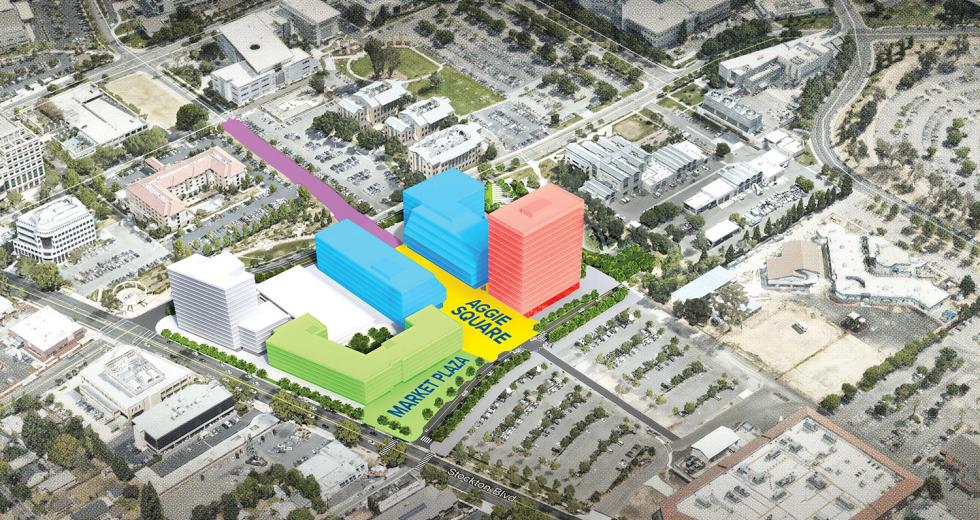Report cards don’t always deliver the results one hopes for, but they can be great motivators. A group of Sacramento-area business, governmental and civic organizations was recently reminded of this after receiving the outcome of a Brookings Institution economic performance assessment they commissioned.
The report, “Charting a Course to the Sacramento Region’s Future Economic Prosperity,” found affects from the Great Recession lingered in our region. Between 2006 and 2016, the region ranked in the bottom third of the 100 largest metropolitan areas in growth (67th), prosperity (71st) and inclusion (84th), all of which are critical to robust economies. However, the authors recognized improved economic performance over the last five years. They noted the region “can take advantage of changing market, technology, and demographic trends, but it must focus on the core drivers and enablers of regional competitiveness and prosperity.”
Not surprisingly, the authors called out UC Davis as a “globally relevant innovation asset” to grow the Sacramento innovation pipeline. Sacramento-area leaders agree, and a number of them have worked with the university to take on bold new strategies for regional competitiveness and more inclusive prosperity. We see opportunities to strengthen neighborhoods with a range of new jobs, services and educational opportunities, and to bolster the local economy.
One such strategy is Aggie Square. In April 2018, I joined Sacramento Mayor Darrell Steinberg to announce the launch of this innovation ecosystem to leverage the talents, technology and innovations of UC Davis to the economic benefit of Sacramento and surrounding communities. Other elected officials expressed support as well. This year’s state budget includes $2.8 million for planning the 25-acre innovation hub on our Sacramento campus that houses UC Davis Health.
Aggie Square will bring together a diverse array of startups, established companies, community organizations and UC Davis researchers, faculty and students. It will be a place to discover new partners, launch businesses, scale ideas and provide economic opportunity to residents across demographics, skill levels and industries. It will leverage our strengths and partnerships in health, agriculture, food technology, clean energy, clean transportation and more.
UC Davis is well-positioned to be a catalyst for innovation that translates into new businesses, new jobs and new wealth for the region. We’re second only to the state government as the area’s largest employer. Our regional economic impact equates to more than 65,000 jobs and nearly $7 billion in economic output annually. We have about 40,000 alumni who live and work in the six-county region and have a stake in seeing their alma mater contribute to the good of their communities.
Our external research funding has been on an upward trajectory for many years, reaching a record $847 million in fiscal year 2017-18, an increase of $64 million from the previous year. Our innovations enabled the startup of 137 companies during the past 10 years; 16 were launched this past fiscal year alone, which set a new record. These startups raised more than $862 million in capital, and much of this investment has gone to products and services that support the health of the planet. For example, Evolve BioSystems, based in Davis, invents products that establish, restore and maintain healthy communities of microorganisms in babies’ intestines. Origin Materials, in West Sacramento, develops less costly ways to swap out fossil fuels for environmentally friendlier wood chips in plastics manufacturing.
Our efforts with Aggie Square are guided by our 31-member Aggie Square Partnership Advisory Council of elected officials and heads of economic development groups like the Greater Sacramento Urban League and Greater Sacramento Economic Council. We also receive advice at the neighborhood level through our Community Engagement Advisory Committee, with 44 representatives of groups including ethnic chambers of commerce, neighborhood associations, and our university’s community research and outreach units.
Over the coming months, we’ll work closely with neighborhood associations in Oak Park, Tahoe Park, Elmhurst and the Broadway-Stockton Boulevard corridor to develop partnerships and hear their concerns about traffic, gentrification and other potential impacts. We anticipate Aggie Square will generate jobs in these communities. Our goal is to recruit as many nearby residents as we can from the surrounding neighborhoods and provide educational opportunities. We want our success to be their success.
Aggie Square will be a live-learn-work-play center of innovation that aims to integrate with the Broadway-Stockton Boulevard corridor and surrounding neighborhoods. We know there’s concern about whether there will be enough housing to accommodate this new workforce — we anticipate building residential units for students and an expanding workforce. We also expect that the City of Sacramento will address the need for more housing and moderate housing prices and rental rates.
I ask our region’s entrepreneurs, business leaders and residents to join the conversation and see how their interests can be part of Aggie Square. We want to hear your voice, and you can make your voice heard through members of our advisory groups. Contact us through https://leadership.ucdavis.edu/aggie-square.
The Sacramento area has all the key factors needed to rise among its metropolitan peers in economic performance. Aggie Square will tie together the winning ingredients — just like an ecosystem — so the whole becomes more efficient and more powerful than the sum of its parts. Together, we have the infrastructure, intellectual capital, business interests and political will to create a new era of innovation and economic impact in Sacramento. Join us as we boldly chart a new course for greater, more inclusive prosperity for all.
Gary S. May, the chancellor of UC Davis, leads the most comprehensive campus in the University of California system, with four colleges and six professional schools. May formerly was the dean of the College of Engineering at the Georgia Institute of Technology. He was inducted into the National Academy of Engineering in September 2018 and honored in 2015 by President Barack Obama with the Presidential Award for Excellence in Science, Mathematics and Engineering Mentoring.



